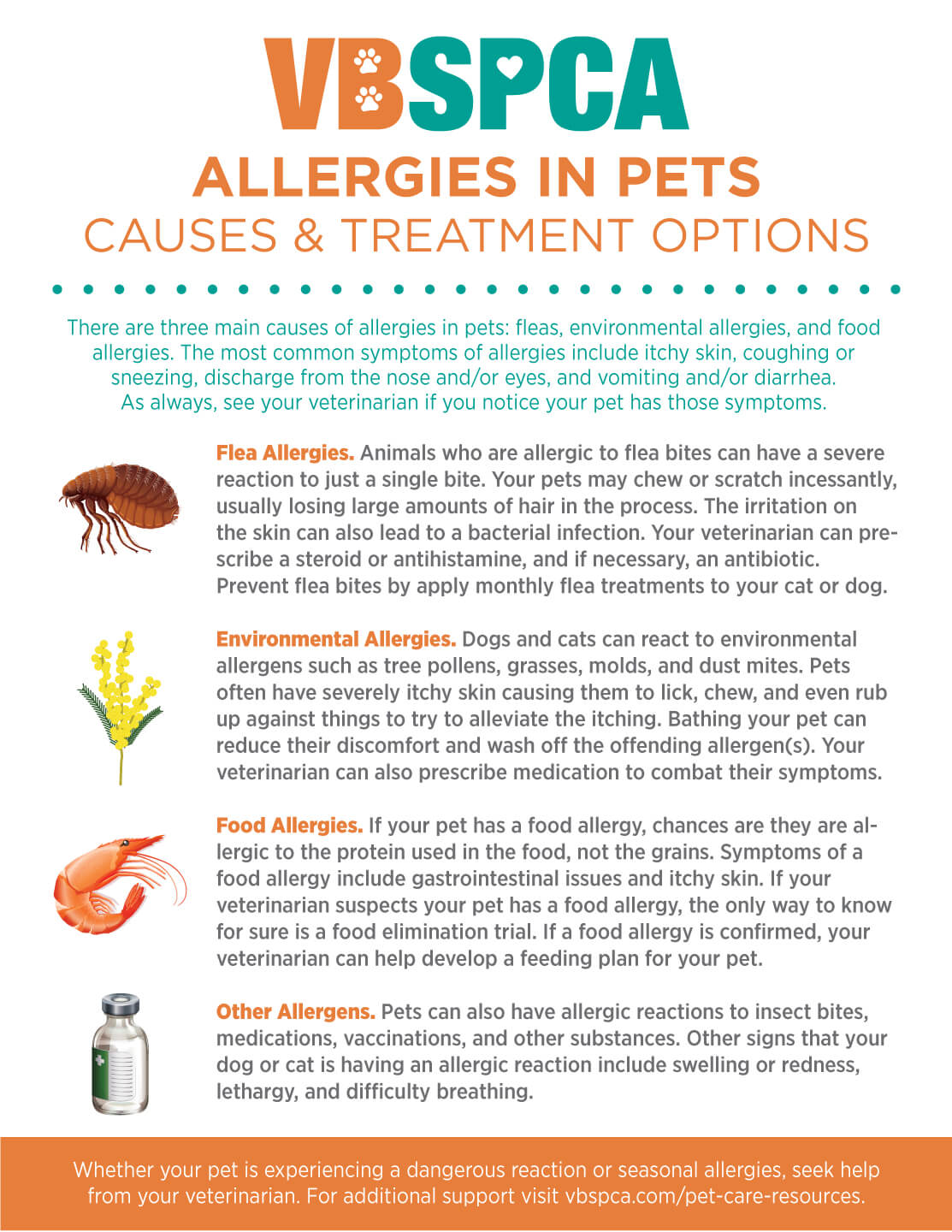Anyone who has ever dealt with allergies certainly understands the misery those symptoms can bring. Unfortunately cats and dogs can also suffer from allergies.
There are three main causes of allergies in pets: fleas, environmental allergies, and food allergies. The most common symptoms of allergies include itchy skin, coughing or sneezing, discharge from the nose and/or eyes, and vomiting and/or diarrhea. As always, see your veterinarian if you notice your pet has those symptoms.
Flea Allergies
Flea bites usually only cause minor irritation in dogs or cats. However, those who are allergic to flea bites can have a severe reaction to just a single bite. Animals who are allergic to flea bites will chew or scratch incessantly, usually losing large amounts of hair in the process. The resulting irritation on the skin can also lead to a bacterial infection. Your veterinarian can prescribe a steroid or antihistamine, and if necessary, an antibiotic.
The best way to prevent issues resulting from flea bites is to apply monthly flea treatments to your cat or dog. Even if your pet is not allergic, these preventatives will help them avoid the discomfort that comes from flea bites.
Environmental Allergies
Just like humans, dogs and cats can react to a variety of environmental allergens such as tree pollens, grasses, molds, and dust mites. While people with these allergies mainly suffer from upper respiratory symptoms, pets are most likely to have severely itchy skin causing them to lick, chew, and even rub up against things to try to alleviate the itching.
Bathing your pet can reduce their discomfort and wash off the offending allergen(s). Your veterinarian can also prescribe medication that can be administered at home or provide your furry friend with an injection to combat their symptoms.
Food Allergies
Food allergies are much less common than flea or environmental allergies, but they can occur. If your pet does have a food allergy, chances are they are allergic to the protein used in the food, not the grains. Symptoms of a food allergy include gastrointestinal issues and itchy skin.
If your veterinarian suspects your pet has a food allergy, the only way to know for sure is a food elimination trial. Your veterinarian would prescribe a very specific diet and you would not be able to feed your pet anything else during the trial. If your pet’s symptoms improve, your veterinarian would then have your pet return to his original diet to confirm the allergy. If a food allergy is confirmed, your veterinarian can help develop a feeding plan for your cat or dog.
Other Allergens
Pets can also have allergic reactions to insect bites, medications, vaccinations, and other substances. In addition to the symptoms mentioned above, other signs that your dog or cat is having an allergic reaction include swelling or redness, lethargy, and difficulty breathing. Whether your pet is experiencing a dangerous reaction or his usual seasonal allergies, it is important to seek help from your veterinarian to keep your pet happy and healthy.






Last Updated: June 8, 2022 by vbspcaadmin
Allergies in Pets | Causes & Treatment Options
Anyone who has ever dealt with allergies certainly understands the misery those symptoms can bring. Unfortunately cats and dogs can also suffer from allergies.

There are three main causes of allergies in pets: fleas, environmental allergies, and food allergies. The most common symptoms of allergies include itchy skin, coughing or sneezing, discharge from the nose and/or eyes, and vomiting and/or diarrhea. As always, see your veterinarian if you notice your pet has those symptoms.
Flea Allergies
Flea bites usually only cause minor irritation in dogs or cats. However, those who are allergic to flea bites can have a severe reaction to just a single bite. Animals who are allergic to flea bites will chew or scratch incessantly, usually losing large amounts of hair in the process. The resulting irritation on the skin can also lead to a bacterial infection. Your veterinarian can prescribe a steroid or antihistamine, and if necessary, an antibiotic.
The best way to prevent issues resulting from flea bites is to apply monthly flea treatments to your cat or dog. Even if your pet is not allergic, these preventatives will help them avoid the discomfort that comes from flea bites.
Environmental Allergies
Just like humans, dogs and cats can react to a variety of environmental allergens such as tree pollens, grasses, molds, and dust mites. While people with these allergies mainly suffer from upper respiratory symptoms, pets are most likely to have severely itchy skin causing them to lick, chew, and even rub up against things to try to alleviate the itching.
Bathing your pet can reduce their discomfort and wash off the offending allergen(s). Your veterinarian can also prescribe medication that can be administered at home or provide your furry friend with an injection to combat their symptoms.
Food Allergies
Food allergies are much less common than flea or environmental allergies, but they can occur. If your pet does have a food allergy, chances are they are allergic to the protein used in the food, not the grains. Symptoms of a food allergy include gastrointestinal issues and itchy skin.
If your veterinarian suspects your pet has a food allergy, the only way to know for sure is a food elimination trial. Your veterinarian would prescribe a very specific diet and you would not be able to feed your pet anything else during the trial. If your pet’s symptoms improve, your veterinarian would then have your pet return to his original diet to confirm the allergy. If a food allergy is confirmed, your veterinarian can help develop a feeding plan for your cat or dog.
Other Allergens
Pets can also have allergic reactions to insect bites, medications, vaccinations, and other substances. In addition to the symptoms mentioned above, other signs that your dog or cat is having an allergic reaction include swelling or redness, lethargy, and difficulty breathing. Whether your pet is experiencing a dangerous reaction or his usual seasonal allergies, it is important to seek help from your veterinarian to keep your pet happy and healthy.
Category: VBSPCA News
Search
Ways to Give
Annual Sponsors
To view our Donor Privacy Policy, click here.